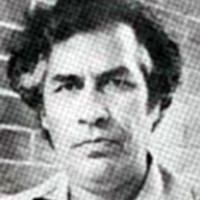Profile of Suroor Barabankvi
Pen Name : 'Suroor'
Real Name : Saeed-ur-Rehman
Born : 30 Jan 1919 | Barabanki, Uttar pradesh
Died : 03 Apr 1980 | Dhaka, Bangladesh
jin se mil kar zindagī se ishq ho jaa.e vo log
aap ne shāyad na dekhe hoñ magar aise bhī haiñ
jin se mil kar zindagi se ishq ho jae wo log
aap ne shayad na dekhe hon magar aise bhi hain
Suroor’s real name was Saeed-ul-Rehman and he was born in 1930 in Pyarepur village of Barabanki, India. He got his education in Lucknow and then in Aligarh.
He started his poetry at the age of 18. He recited his poetry to Jigar Moradabadi who appreciated his poetic talent. Jigar used to participate in Mushairas at Dhaka. In 1951 Suroor participated in the Independence Day Mushaira at Dhaka, along with Jigar Moradabadi who introduced him to the organisers of Mushaira and other people. He loved the response of the public and his attachment with East Pakistan began there. In 1952 he visited East Pakistan for another such congregation of Urdu poets. Maulvi Abdul Haque offered him the job of General Secretory in the ‘Anjuman-e-Taraqqi-e-Urdu’ Dhaka office. This time, he decided to settle there.He called his family and settled there. He started a magazine named ‘Filkaar’, but unfortunately only one issue of this magazine came out. He then started another magazine “Aab-o-Gul”.
Suroor rose to the heights of popularity during the 1960s.In 1962, when Captain Ehtesham made the first Urdu film, “Chanda”, Suroor Barabankvi wrote its story and script, apart from its songs. ‘Firdausi Begum’ popularly known as The Koel of Bengal, sang few songs in ‘Chanda’ which were quite hit.
Suroor also wrote the Lyrics for many Urdu films. He was known as ‘Sahir’ of Dhaka film studio. He wrote many of the very popular numbers, for ‘Talash’ and ‘Chand Aur Chandni’. In Talash, under the guidance of that master crafter, Robin Ghosh, he wrote such hits as ‘Kuch Apni Kahiyye, Kuch Meri Suniye’ (Bashir Ahmed, Firdausi) and the famous number by Bashir Ahmed, ‘Main Rickshawala Bechara’. In Chand Aur Chandni, literally every song was the talk of the town, including ‘Yeh saman’ (Mala), ‘Teri Yaad Aa Gai’ (Masood Rana), ‘Laai Ghata Motiyon Ka Khazana’ (Mala chorus), ‘Jan E Tamanna Khat Hai Tumhara’ (Ahmed Rushdi), ‘Mera Khayal Ho Tum’ (Masood Rana) and ‘Tujhe Pyar Kee Qasam Hai’ (Mala and Masood Rana). Later, in ‘Kajal’, his lyrics and the resultant song, ‘Yeh Aarzoo Jawan Jawan’, ‘Yeh Chandni Dhuan Dhuan’, sung so beautifully by Firdausi Begum, was a rage all over Pakistan. In ‘Nawab Sirajuddaula’, his ghazal, ‘Hai Yeh Aalam Tujhe Bhulane Mein, Ashk Aatey Hain Muskuraney Mein’, by Firdausi Begum, was highly liked. Similarly, in Rehman’s own film, ‘Milan’, he wrote ‘Tum Salamat Raho, Muskurao Hanso, Main Tumharey Liyay Geet Gata Rahoon’.
He shifted to Pakistan in 1970, but the memories of those days at Dhaka seemed to have deserted him. He was depressed and sad, and although he wrote much poetry against the system and the governments, as a true progressive poet that he was, people who knew him felt he wasn’t the same Suroor as before. Still, his lyrics for films continued to touch the people, like Runa Laila’s ‘Hamein Kho Kar Bahot Pachtaoge Jab Hum Naheen Honge’ from film ‘Ehsas’. In ‘Aaina’, all his numbers were glorious hits. Mehdi Hasan’s ‘Kabhi Main Sochta Hoon Kuch Na Kuch Kahoon’ was the rebirth of Mehdi Hasan. Another ever popular hit was, ‘Samaan Who Khwaab Sa Samaan, Mile The Dil Se Dil Jahan’, sung by Akhlaq Ahmed in Nazrul Islam’s film, ‘Naheen Abhi Naheen’. It was composed brilliantly by Robin Ghosh, and it seems he was fondly recalling the days he had spent in that atmosphere of love and harmony in Dhaka.
Suroor Barabankvi produced three films. His first effort was ‘Aakhri Station’, which he made on Haajra Masroor's short story, ‘Pagli’. Shabnam played a dumb and deranged girl in it, who loiters on the railway station. It was an artistically dealt movie. Suroor also made Krishan Chandar's short story, ‘Anjan’, into a haunting film, called ‘Tum Mere Ho’. Its songs including ‘Wahi Gham Hai Wahi Tanhai’ sung by ‘Mala’ were quite famous. In West Pakistan, he made ‘Aashna’, on poetess Waheeda Naseem's short story, ‘Begaangi’, but it did not do well. He wanted to make his fourth film on the POWs. The script of this film was almost written down, and was titled ‘Camp No. 333’, but unfortunately when he had gone to Dhaka to finalize arrangements for its shooting, he had a heart attack and died on 3rd April, 1980. His body was brought to Karachi and buried there.
His collection of poetry “Sang-e-Aftab” was first published in 1975. His second collection named ‘Soz-Geeni’ was published by his daughter Aimen Suroor in 1980.

